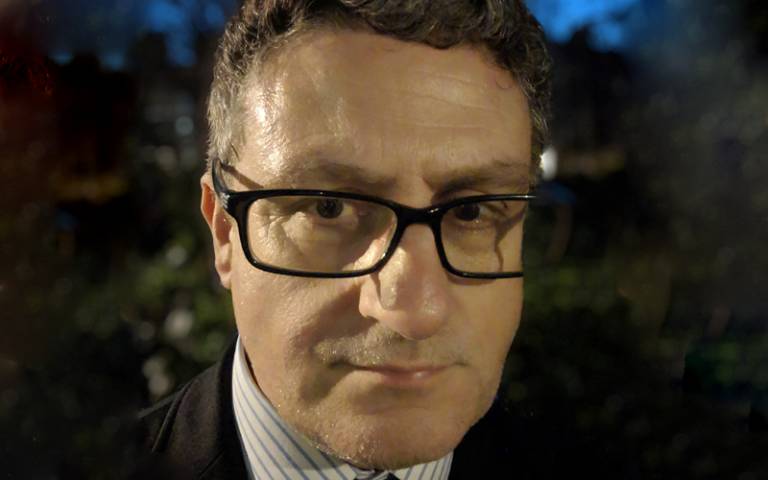Opinion: Pundits who defied Putin on Russian TV could embolden others
14 March 2022
After two people spoke out against the war in Ukraine on Russian state TV, Professor Mark Galeotti (UCL School of Slavonic & East European Studies) writes about what that might suggest about public opinion in Russia.

During my many visits to Russia I occasionally tune in to a popular prime-time show called An Evening with Vladimir Soloviev.
Hosted by one of the country's most toxic state propagandists, it is a useful political weather vane, and it throbs with patriotic, testosterone-fuelled fervour.
Less a chat show than a bear-pit, the carefully selected guests jostle for position to see who can spout the most extreme pro-Kremlin sentiments, and many people watch it more for the gladiatorial entertainment it offers than its take on current affairs.
A geopolitical Jeremy Kyle, if you will, dedicated to the cult of Putin.
It is certainly the very last place I would expect to hear anyone raise criticism of Putin's 'special military operation' in the Ukraine (remember, if you call it a 'war' in Russia you face 15 years behind bars).
Yet on Thursday night, not one but two people did just that: one a leading academic, the other a filmmaker.
The former, Semyon Bagdasarov, called for an end to the operation, citing his fear it could become a humanitarian disaster and comparing it to the Soviet invasion of Afghanistan, which helped bring down the USSR.
The latter, Karen Shakhnazarov, sought to bust the Kremlin's narrative that this was a limited exercise.
Naturally, Soloviev shut them both down as quickly as possible, but you cannot put the genie back in the bottle, and the words were – and are – out there.
And that they are is highly significant, an indication that despite the Russian state's draconian attempts to control public opinion, this war – a word we can use here in the West – is very much Putin's and not that of the Russian people, whatever the opinion polls may say.
Moreover, these murmurs of dissent have bubbled over rapidly: the conflict is not yet three weeks old, but already we have seen grumblings and, in some cases, open dissent not only on the streets but threading through social media channels. Anonymous, yes, but there nonetheless.
Nor is everyone incognito. Earlier this week, on the Defence Ministry's own TV channel – usually home to a steady churn of World War Two films and jingoistic programmes highlighting the robust heroism of the Russian military – none other than a serving army officer suggested that Russian casualties in the Ukraine were greater than advertised.
The presenter did his best to stop this heretic in his tracks, leaping from his chair and insisting that 'our boys' are 'killing fascist snakes' as he rushed across the studio.
But again, it was too late, the suggestion had been made.
By contrast, when the Soviet Union invaded Afghanistan in 1979 for the start of what would be a ten-year conflict, it took years, not weeks, for citizens to openly voice their dissent.
That war remains a sore point, viewed by many as a conflict initiated by an ageing and out-of-touch leadership that led to untold misery and needless loss of life.
I suspect I need not draw any parallels here with the current situation, although Semyon Bagdasarov did just that.
At a time when Russian soldiers are starting to return from the war with their own tales – ones which do not necessarily chime with the reports put out by the Kremlin's own news machine – it's an extremely notable intervention.
Of course, this does not mean the tide of public opinion is against Putin, and high levels of paranoia among most Russians mean it is not always easy to gauge the true national sentiment.
But there is no question that social media has turbo-charged sceptical discussions that might otherwise have taken place quietly around kitchen tables with trusted friends.
Now those sentiments have been aired on national television we are in new territory.
I have no doubt it will embolden people to start talking about the dead-end into which Putin is leading them – and what needs to be done to save the Motherland.
And some of them may be happening in the Kremlin.
This article first appeared in Mail Online on 11th March 2022.
Links
- Original article in Mail Online
- Professor Mark Galeotti’s academic profile
- UCL School of Slavonic & East European Studies
- UCL Social & Historical Sciences
 Close
Close

